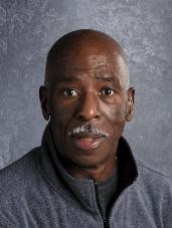 Beyond Imagination
Beyond Imagination
Edgar Baxton II
Edgar Baxton, 65, is a health teacher at the Fort Dodge Middle School in Fort Dodge, Iowa. He also coaches junior varsity volleyball at Fort Dodge Senior High. He was diagnosed with amyloidosis in 2015 and needed a heart and liver transplant to save him.
What transpired through his medical journey was a true out-of-body experience that changed his life physically, mentally and spiritually, according to Baxton.
“It makes you become very aware that there is more to life than what we have right here,” Baxton said. “Everybody wants to live today, but there is a life beyond this life.”
The signs of amyloidosis can be difficult to detect early on. In the summer of 2012, Edgar began having trouble breathing. His wife, Tara Baxton, explained “It was like a cold or allergy that just seemed to get worse.” The couple went to see a cardiac doctor at Unity Point Health – Trinity Regional Medical Center in Fort Dodge. “He was treated for heart failure,” she said. “The cause was unknown.” What followed was periods of improvement then further declining.
In 2013, he received a pacemaker. For about two and a half years his condition fluctuated. Finally, he was referred to a heart specialist at Mercy Medical Center in Des Moines, Iowa. Doctors there performed tests on Edgar’s heart – one of which was a cardiac echo. It showed some shadowing on his heart. Doctors suspected amyloidosis.
In 2015 at the Mayo Clinic in Rochester, Minnesota, the diagnosis was confirmed. The news was not good. Edgar would need a heart transplant. He was status 1B. Status 1A is the highest priority transplant. As he waited for a transplant, his heart condition deteriorated.

Before heading back to Rochester, Edgar wanted to finish out his season of coaching. “We had a volleyball game at Ames High School,” he said. “I didn’t want to leave until I finished the JV regular season. We finished that game. Every team won and the next day Tara and I drove to Rochester.”
Upon arrival, on Oct. 14, 2015, his transplant status was immediately upgraded to 1A. “They had to keep his heart pumping because it was continuing to decline,” Tara said. “He was having difficulty walking down hallways. He would walk five, maybe seven steps before he would have to stop and lean against a wall.”
It was then that doctors determined Edgar would also need a liver transplant. “The liver was involved in protein production that affected his heart,” his wife explained. “Why put in the heart when the liver could potentially destroy the heart?” The wait was on. “It was either do the transplant or pass,” said Edgar. As he waited, he bonded with others needing a transplant. “We became a family.”
He knew a man who waited for 595 days for a transplant. “It’s hard to look at revitalizing yourself with someone else’s organs,” he said, “but that’s the only way you can go. It’s sad that someone else had to die for me to live, but I am grateful.”
While waiting, he found joy in a group of volunteer Mennonite girls who began singing to him in December 2015. “One of the strongest things was the Mennonite girls,” he said. They would sing to him on Sundays and Wednesdays.
“These songs were songs that I heard when I was a child growing up in Columbus, Ohio. “It reminded me of home a lot. It was very comforting for me.” The girls sang to him up until his transplant. “They were my friends,” he said. He asked that they leave the door open so others could listen in.
He waited 175 days for his transplant. “I cried a lot waiting for the transplant,” he said. “I didn’t want to feel sorry for myself, but it was a very emotional time.” It wasn’t until April 5 that the right donor organs became available.
On April 6 at 10:42 a.m. doctors made the first incision. While under the knife, he saw things. “The level of scariness is off the chart,” he said. “When you do pass, you find that God is in everything. Not a person, but a state of everything, because you are judged. You see the good. You see the bad and it’s scary – because you have to be accepted, but also be worthy of the gift that is given.”
Later he would share his thoughts with other transplant patients. “We know there is a reality that is beyond the reality that we are living every day,” he said. “It’s an out-of-body experience, which we all have. It’s beyond believing. Seeing that God is beyond our imagination because we haven’t the concept to understand it,” he added. “I want students to understand that, yes, this is just the body, but beyond is the spirit.”
By 3 p.m. Edgar Baxton had a new heart. Then a different set of surgeons came in for the liver transplant. That operation was completed by 7:30 p.m.
After a few weeks of rehabilitation, he was discharged from St. Mary’s Hospital on April 30. He spent three months in Rochester, post-surgery. On July 1 he was told he could come home. “When he got back, he was grumpy,” Tara said. “But when volleyball season started, he began to smile again.” The game gives him purpose. “It makes me feel worthy and worth something,” he said. “The kids are ornery, but they are a work in progress. They are our future.”
His energy level has been good, but he wears out more quickly than he used to. “His doctors weren’t sure if he should return to teaching or coaching, but he has had an excellent recovery and their consensus is that he is handling it fine,” said Tara.
“The kids know I have had a heart and liver transplant, so they give me a break sometimes,” he said. It’s a challenge not to be as active as he was. “I don’t follow all the rules,” he said. “The doctors probably wouldn’t be overly excited about me climbing up on the roof cleaning the gutters. I find myself getting bored and so I’ll do things.”
Now back in his element in Fort Dodge, Edgar Baxton looks back at his transplant journey with fascination. “The period in which I was unconscious, I think that was the reality,” he said. “That I was going to make it. I had realized the transplant had occurred, but I didn’t know. Literally I didn’t know what was going on, but I was dreaming of things. I had a lot of dreams. These dreams are vivid to the point that you know, you see people. You go back in time.”
– Chad Thompson, The Messenger News. Reprinted with permission.
